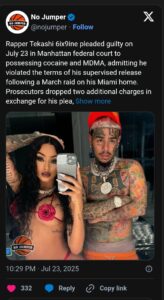
Rapper Tekashi 6ix9ine, born Daniel Hernandez, pleaded guilty Tuesday to federal drug possession charges in Manhattan federal court, adding another twist to his long and contentious legal saga…CONTINUE FULL READING>>>>>
The 29-year-old admitted to possessing cocaine and MDMA, in violation of the terms of his supervised release—terms that stem from his cooperation with federal authorities in the 2018 case against the Nine Trey Gangsta Bloods.
The plea follows a March 12, 2025, raid at his Miami home, where authorities found “residual” amounts of the illicit substances in a bedroom cabinet. The raid, spurred by a confidential tip alleging possession of MDMA and a firearm, also uncovered additional contraband in a pool house. However, prosecutors declined to pursue charges related to that discovery due to lack of evidence directly linking Hernandez to the items.
Appearing before U.S. District Judge Paul A. Engelmayer—the same judge who sentenced him in 2019—Hernandez presented a subdued image, clad in a black hoodie with his natural hair in braids, a sharp contrast to his once-iconic rainbow look. He entered a guilty plea to two counts of drug possession, while prosecutors dropped two additional charges as part of a negotiated agreement.
In a surprising turn, Assistant U.S. Attorney Jonathan Rebold noted that Hernandez “has made progress,” recommending a delay in sentencing to allow completion of remaining community service hours and mental health treatment. Judge Engelmayer granted the request, rescheduling sentencing for September 25, 2025.
Tekashi 6ix9ine’s notoriety largely stems from his 2018 arrest with the Nine Trey Gangsta Bloods. Facing charges that could have led to 47 years in prison, he opted to cooperate with prosecutors. His testimony during the 2019 trial of gang leaders Anthony “Harv” Ellison and Aljermiah “Nuke” Mack was instrumental in their convictions, earning him praise from the judge and a reduced sentence: two years in prison, five years of supervised release, and community service.
Tekashi 6ix9ine was released early in April 2020 due to COVID-19 concerns, but he has struggled to comply with the conditions of his release.
The current charges mark the second major breach of supervised release. In November 2024, 6ix9ine served 45 days in custody for violations including unauthorized travel, missed drug tests, and lying to his probation officer. At that time, Judge Engelmayer rebuked him, saying Hernandez’s actions suggested he believed the rules didn’t apply to him.
Adding to his troubles, Hernandez faced legal issues in the Dominican Republic, where he was arrested twice in 2023 and 2024 for alleged assaults—cases his legal team claimed were based on fabricated evidence.
In court this week, 6ix9ine revealed he is undergoing therapy for depression and PTSD, though he admitted to not consistently taking his prescribed Zoloft. Prosecutors cited his mental health progress and cooperation in their push for leniency.
As part of his sentence, 6ix9ine still must complete approximately 40 hours of community service. His legal team has requested secure environments due to credible threats from his past cooperation. The rapper continues to employ extensive private security amid safety concerns.
While federal sentencing guidelines recommend three to nine months per count, Judge Engelmayer is not bound by those limits. He has previously shown willingness to impose stricter sentences when warranted. At the September hearing, factors like Hernandez’s mental health efforts, community service completion, and courtroom demeanor will weigh against his history of violations and public defiance of court orders.
At stake is not only potential prison time—up to five years—but also the long-term structure of his supervised release, which may include stricter travel restrictions, mandatory treatment, and enhanced oversight.

Tekashi 6ix9ine’s case underscores the challenges faced by high-profile individuals navigating the criminal justice system. Despite the advantages gained through his cooperation, repeated failures to comply with legal obligations threaten to undermine that goodwill. His legal odyssey also spotlights broader issues surrounding celebrity justice, the rigidity of supervised release, and the risks faced by informants in federal gang prosecutions…CONTINUE FULL READING>>>>>


